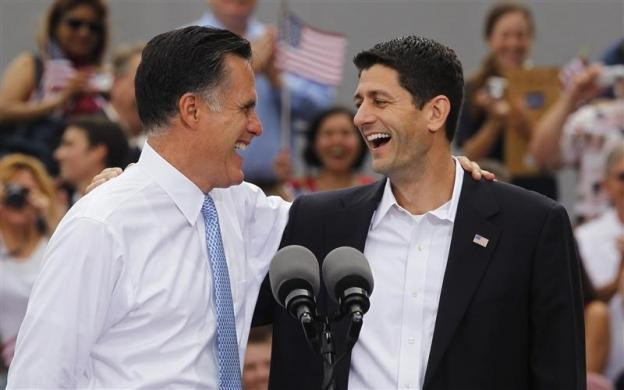Republican Vice-Presidential Candidate Paul Ryan Lookalike Throws Granny off Cliff in TV Ad [VIDEO]
Mitt Romney running mate mocked in attack ad that accuses him of ending guaranteed Medicare health insurance for pensioners

A television advert has lampooned US Republican vice-presidential candidate Paul Ryan for his plans to scale back the Medicare system, which guarantees access to health insurance for American pensioners.
In the advert, an actor strongly resembling Ryan pushes a granny in a wheelchair around a park, before throwing her off a cliff.
The commercial continues with the message: "Is America beautiful without Medicare? Ask Paul Ryan and his friends in Congress." It then gives Ryan's Congress phone number.
The ad, made privately by political group The Agenda Project, refers to Ryan's plans to raise the qualification age for Medicare support from 65 to 67, and scale back the level of state involvement.
Under Ryan's programme, rather than receiving healthcare insurance directly from the state, senior citizens would receive vouchers to purchase their own private health programmes.
The ad was originally released last year, but The Agenda Project is now re-releasing it in four 'swing states' ahead of America's presidential elections.
Angry seniors
Ryan's proposal to convert Medicare into a voucher system is likely to anger elderly voters, who usually represent a key source of strength for his Republican party. In recent opinion polls, Republican presidential candidate Mitt Romney led his opponent, Barack Obama, by a considerable margin among the elderly.
The campaign team representing Obama has been quick to seize on Ryan's Medicare proposals, in an attempt to win back support among America's seniors.
"Romney and Ryan want to end Medicare as we know it while giving millionaires a tax cut - and Floridians aren't buying it," Obama's staff wrote on the president's official twitter account - aiming their message at Florida, a state with a large population of pensioners.
Criticism of NHS
In 2009, Ryan wrote an article attacking Britain's National Health Service (NHS) in the Wall Street Journal.
Demonstrating his stance on healthcare, Ryan wrote: "We need only look to Great Britain and elsewhere to see the effects of socialised healthcare on the broader economy.
"Once a large number of citizens get their healthcare from the state, it dramatically alters their attachment to government.
"Every time a tax cut is proposed, the guardians of the new medical-welfare state will argue that tax cuts would come at the expense of healthcare - an argument that would resonate with middle-class families entirely dependent on the government for access to doctors and hospitals."
© Copyright IBTimes 2025. All rights reserved.





















